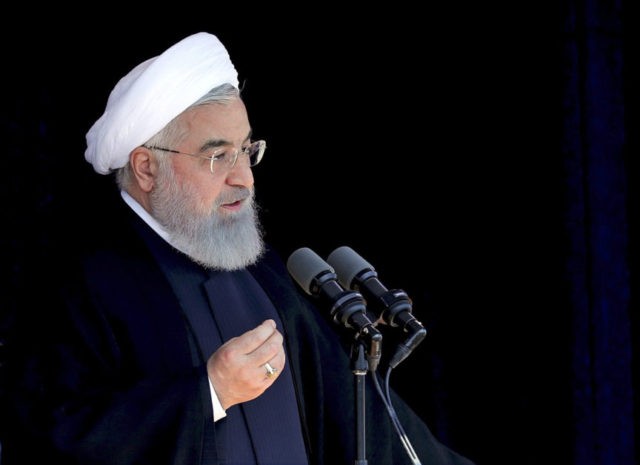The United States will suffer “historic regret” if it pulls out of the controversial nuclear agreement reached between U.S.-led world powers and Tehran back in July 2015, Iranian President Hassan Rouhani reportedly cautioned over the weekend.
On Monday, the president of state-sponsor of terror Iran appears to have changed his tune, hinting that the Islamic Republic may remain in the nuclear pact with world powers even if the U.S. drops out, Reuters reports.
Rouhani emphasized over the weekend that Iran would further resist America’s pressure to limit its influence in the Middle East, a position that already mirrors the status quo.
Echoing comments made last week by Vladimir Yermakov, a high-ranking official at Russia’s Foreign Ministry, President Rouhani argued that U.S. withdrawal from the agreement would not spell the end of it.
The president of the Islamic Republic noted that Iran is preparing for various scenarios, including a deal that would include all signatories that remain committed to it except the United States or no pact at all.
According to Reuters, President Rouhani proclaimed in a speech carried live on Monday on state TV.
We are not worried about America’s cruel decisions. … We are prepared for all scenarios and no change will occur in our lives next week.
If we can get what we want from a deal without America, then Iran will continue to remain committed to the deal. What Iran wants is our interests to be guaranteed by its non-American signatories. … In that case, getting rid of America’s mischievous presence will be fine for Iran.
Rouhani’s comments came amid the looming May 12 deadline for American President Donald Trump to decide whether to reimpose sanctions on the Islamic Republic, a move that would imperil the deal reached between Tehran and U.S.-led world powers in July 2015.
On Monday, the Iranian president appears to have changed his tune from remarks disseminated live by state television the previous day.
“If America leaves the nuclear deal, this will entail historic regret for it,” Rouhani warned Sunday, stressing that the U.S. would suffer remorse if it withdraws from the pact “like never before.”
Iran has “a plan to counter any decision Trump may take, and we will confront it,” he also cautioned, further adding, “Orders have been issued to our atomic energy organization and to the economic sector to confront America’s plots against our country. America is making a mistake if it leaves the nuclear accord.”
The pact — between Iran, the United States, China, Russia, Germany, France and the UK — is supposed to restrict Iran’s nuclear operations in exchange for relieving the Islamic Republic of crippling economic sanctions, namely those imposed by the United States and the United Nations.
However, Israel argues that U.S.-led world powers entered into the deal under false pretenses.
Citing “new and conclusive proof” of violations at the hands of Iran, Israeli Prime Minister Benjamin Netanyahu has accused Tehran of continuing to hide and enhance its nuclear weapons program after the agreement.
Iran insists that it never sought to build a nuclear weapon, repeatedly arguing that its atomic program is for peaceful civilian purposes.
BBC reports, “Iran branded Israeli Prime Minister Benjamin Netanyahu a liar and said the documents he produced were a rehash of old allegations already dealt with by the International Atomic Energy Agency (IAEA), the UN’s nuclear watchdog.”
Echoing the Israeli PM, Sarah Huckabee Sanders, the White House press secretary, told reporters last week. “The deal was made on a completely false pretense. Iran lied on the front end.”
In the wake of Israel’s accusations, U.S. Secretary of State Mike Pompeo has also said that the 2015 Iran nuclear deal was “built on lies.”
Pompeo told lawmakers in April:
I want to fix this deal. … If there’s no chance that we can fix it, I will recommend to the president that we do our level best to work with our allies to achieve a better outcome and a better deal. … Even after May 12, there’s still much diplomatic work to be done.
To the dismay of the U.K., France, and Germany, the Trump administration has threatened to withdraw from the agreement absent changes to its “disastrous flaws.”
America’s European allies and Russia have suggested they do not intend to leave even if America pulls out.
China, a permanent member of the United Nations Security Council and one of the architects of the agreement, reiterated last week that all signatories should continue to uphold the deal.
In February, Gen. Joseph Votel, the top commander in the Middle East, cautioned that the lifting of sanctions under the nuclear pact has allowed China to enhance its relationship with Iran.
China has deployed troops to Syria to allegedly fight on the side of Iranian and Russian-allied dictator Bashar al-Assad. Muslim Uighurs or Uyghurs from China fighting on behalf of jihadist groups in Syria pose a threat to China.
Russia, another signatory to the deal, has demanded no changes to the agreement, further arguing that the withdrawal of the United States would not necessarily end the pact, officially known as the Joint Comprehensive Plan of Action (JCPOA).
Except for the United States, all signatories to the deal appear to remain committed to the accord.
“[I]n an effort to keep Washington in it, want to open talks on Iran’s ballistic missile program, its role in Middle East crises such as Syria and Yemen, and its nuclear activities beyond 2025 – the year when key provisions of the deal expire,” Sky News reports.
“We will not negotiate with anyone about our weapons and defenses, and we will make, and store as many weapons, facilities, and missiles as we need,” Rouhani said.

COMMENTS
Please let us know if you're having issues with commenting.